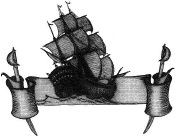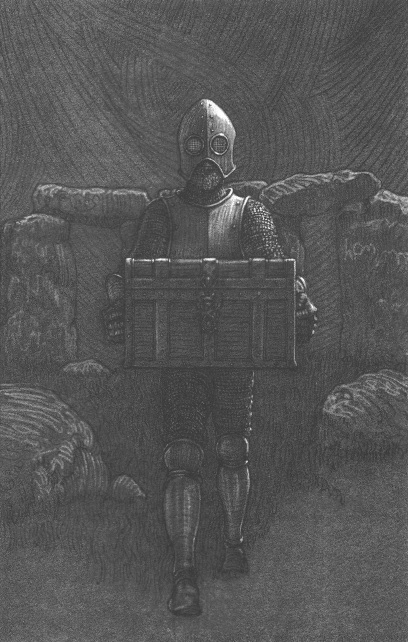Peter and the Shadow Thieves (48 page)
Read Peter and the Shadow Thieves Online
Authors: Dave Barry,Ridley Pearson
Tags: #Juvenile Fiction, #General, #Action & Adventure

A RAVEN’S EYE
T
HE RAVENS STOOPED atop the ancient weather-scoured gray stones, their gleaming, beady eyes darting in every direction. Every few seconds the largest of the birds fixed his sight on two distant pinpricks of yel ow—the windows of the cottage where Ombra waited.
For hours the ravens, restless yet infinitely patient, had watched the empty grassland. Then one of them saw it—a faraway movement no human eye would have detected.
Caw!
came the alert. Then again,
Caw! Caw!
The others saw it now: tiny shapes, a rider and a wagon approaching on the road from the vil age.
The large raven flapped his wings, roiling the stil air with a shudder of feathers, and lifted into the sky. It grew smal er, an occasional
caw
marking its progress toward the dim lights of the distant cottage.
Nerezza, dozing in a chair, sat up with a start, awakened by scratching at the cottage window. Carrying a dripping candle, he walked stiffly toward the sound, his back sore from the long carriage ride.
He pul ed back the curtain and jumped: there stood a large raven, head sideways, big black eye pressed toward the glass. Nerezza, furious at himself for being scared by a bird, raised his fist to bang the glass.
Then he felt the chil just behind him.
“Let him in,” groaned Ombra.
Without turning around, Nerezza fumbled with the latch and got the window open. His candle’s flame danced as the bird hobbled inside and ruffled its feathers. It faced Ombra, suddenly stil as death.
“The candle,” said Ombra.
Nerezza breathed heavily, his nose whistling, as he brought the candle close to the bird’s left side, so its shadow was cast on the windowsil . The raven made no effort to avoid the flame. Ombra raised his right arm and touched the shadow.
“Two men,” Ombra groaned. “One on horseback, one driving a wagon. On the vil age road.”
Ombra withdrew his hand. The raven, with a loud
Caw!
flapped off.
“Just two of them?” said Nerezza. He immediately regretted speaking, as Ombra turned to face him, his empty hood gaping.
“If that is Aster,” Ombra said, “as I believe it is, it makes no difference whether he has one man with him or a hundred. He is in possession of immense power, Captain; far more than we have. We have the element of surprise, and we have his wife. But we must not underestimate the power he has. Is that clear, Captain?”
“Yes, my lord.”
“Summon the men, and have Slank bring Mrs. Aster. We leave immediately.”
“Yes, my lord.”
In a minute’s time they gathered in front of the cottage: Ombra, Nerezza, and Slank holding the limp arm of the vacant-eyed Louise Aster. They were joined seconds later by a half dozen men, two of whom carried rifles. They set out across the grassland, Ombra gliding effortlessly ahead. The men had to trot to keep up with him; Slank was practical y carrying the passive Louise Aster.
They approached Stonehenge from the southwest, directly opposite the entrance from the vil age road. Ombra chose a path that took them past several ancient burial mounds, keeping them out of sight of the road.
Twice the large raven fluttered to a landing on Ombra’s shoulder, then took off again. The second time, Ombra turned and gathered the others around. Speaking in a barely audible moan, he said: “They wil arrive soon on the far side of the stones. Just ahead is a ditch. You wil conceal yourselves in it and await my orders.” He pointed to the two men with rifles. “You wil position yourselves on either side of me. Mister Slank, you wil keep Mrs. Aster close at hand.” The men, ghostly silhouettes in the moonlight, moved forward into the shal ow ditch that surrounded Stonehenge. The large raven fluttered forward and joined the other sentries atop the ancient stones.
For a moment, the night fel silent.
And then, from the distance, came the gentle
clippity-clop
of approaching horses.


THE RETURN
A
STER AND MAGILL approached the great stones from the northeast, climbing the gently rising hilside where Stonehenge was erected thousands of years earlier by people unknown, for reasons unknown.
As the two men drew near the tightly grouped arrangement, they began to see its various elements clearly in the bright moonlight.
Most dominant from the outside were the sarsen stones, standing in a circle one hundred feet across, each stone thirteen feet high and seven feet wide. Some were stil supporting horizontal stones, cal ed lintels, though most of those had long since fal en. Within the sarsen stone circle were the remains of another circle of smal er stones, known as bluestones, about six feet high, many of them now toppled or missing. Inside the bluestone circle stood the mighty trilithons, each made of two huge vertical stones, only a few inches apart, supporting a lintel. At one time there were five of these structures, the tal est standing twenty-four feet high. Three were stil intact.
The entire grouping was surrounded by an ancient ditch, forming a circle more than three hundred feet across. On the northeast side of this ditch was an opening, which led out to the road. Standing next to the road, far from the main grouping, stood a lone sarsen, sixteen feet tal . This was known as the Heel Stone. It was here that Leonard Aster halted his horse, signaling for Magil to stop the wagon behind him. The men studied the main stone grouping. They saw nothing unusual, other than some dark birds perched atop the central trilithons. Aster’s eye lingered on the birds for a moment, as he realized they were ravens.
Like the ravens at the Tower
, he thought.
Odd.
Seeing no other humans, Aster signaled to Magil , who uttered a series of soft barking sounds. Instantly the wolves emerged from the field. Five took up sentry positions along the road; the sixth began a slow surveil ance around the perimeter of Stonehenge.
Aster and Magil rode forward toward the main stone grouping. At the break in the ditch they came to the Slaughter Stone, a massive sarsen slab lying on its side, its uneven surface marked by hol ows that, some said, once col ected the blood of those who were sacrificed on it. Here Aster dismounted, tying his horse to a shrub. Magil climbed down from the wagon and removed the canvas covering. With a growl, Karl, the enormous bear, rose and clambered down from the wagon bed. He picked up the dark trunk and set it gently on the ground.
Aster opened the cloth sack. He removed a golden helmet, which shone like fire in the moonlight, and set it on the wagon bed. Next came a pair of golden boots, fol owed by a pair of golden gloves and a golden suit, both fashioned of a thin material that flexed like cloth.
Aster glanced up at the moon and frowned. The left side of the moon’s surface was distinctly darker than the right. It was not the sharply defined darkness that appeared on the sun in a solar eclipse, but the gradual shading of the lunar eclipse.
“It’s starting,” Aster said. He quickly shrugged off his coat and removed his boots, then began putting on the golden suit.
Magil watched unhappily.
“Wish you’d let me do this,” he said.
“I appreciate that, Magil ,” said Aster. “But it’s too dangerous.”
“I could take Karl out there with me,” said Magil . “Never seen the danger Karl couldn’t handle.” Aster smiled and shook his head. “I’m afraid even Karl is no match for what’s in there,” he said, pointing to the trunk. “Somebody has to open the trunk when the eclipse reaches totality, and the moon is dark. Whoever that is has to be wearing this suit. Anybody else…any
thing
else…would die instantly.”
“But some has withstood it,” said Magil . “I’ve heard that.”
“That’s true,” said Aster. “Every once in a great while somebody comes along who can tolerate starstuff in large quantities.” He thought of Peter and his unwitting exposure back on the island—an exposure that gave him the power of flight, and agelessness, and…nobody knew what else. “But that’s a very rare quality,” he continued. “I doubt that more than a few people on Earth could survive being exposed to what’s in that trunk. Could you give me a hand with these gloves? They’re rather snug.” In a moment, with Magil ’s help, Aster was clad from neck to toe in the gleaming gold suit. He looked at the moon again; the shadow had deepened and broadened, and the moon now had a pronounced reddish hue.
“Al right,” he said to Magil . “I’l take the trunk in now. When the Return begins, the light may attract somebody from the vil age. You must not, under any circumstances, al ow anyone to enter the stone circle. Nor must you or any of the animals enter. No matter what you see, or what you hear, once the Return has begun,
you must stay away.
”
“What if there’s trouble?” said Magil . “What if you need help?”
Aster laid a gold-gloved hand on Magil ’s shoulder. “I’l be fine,” he said softly. “And if I’m not, there’s nothing you, or anybody, can do.” Aster put on the gold helmet. It covered his head and neck entirely; it had two holes in front, each covered with a fine gold mesh, which protected his eyes but enabled him to see quite wel . With the helmet snugly in place, Aster bent and grabbed the trunk—which was much lighter than its bulk suggested—and hoisted it easily to his shoulder.

